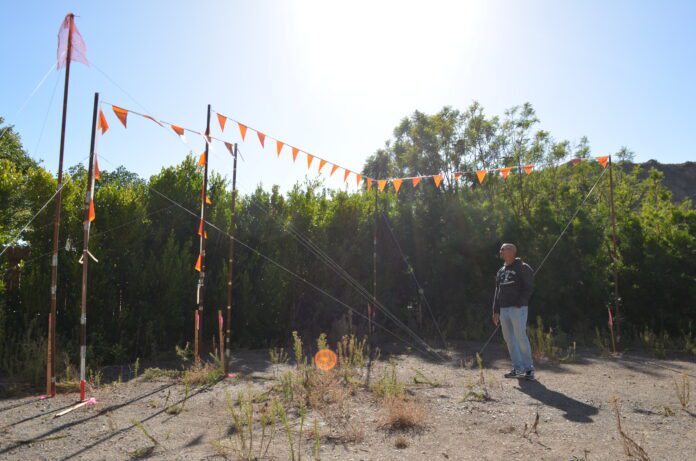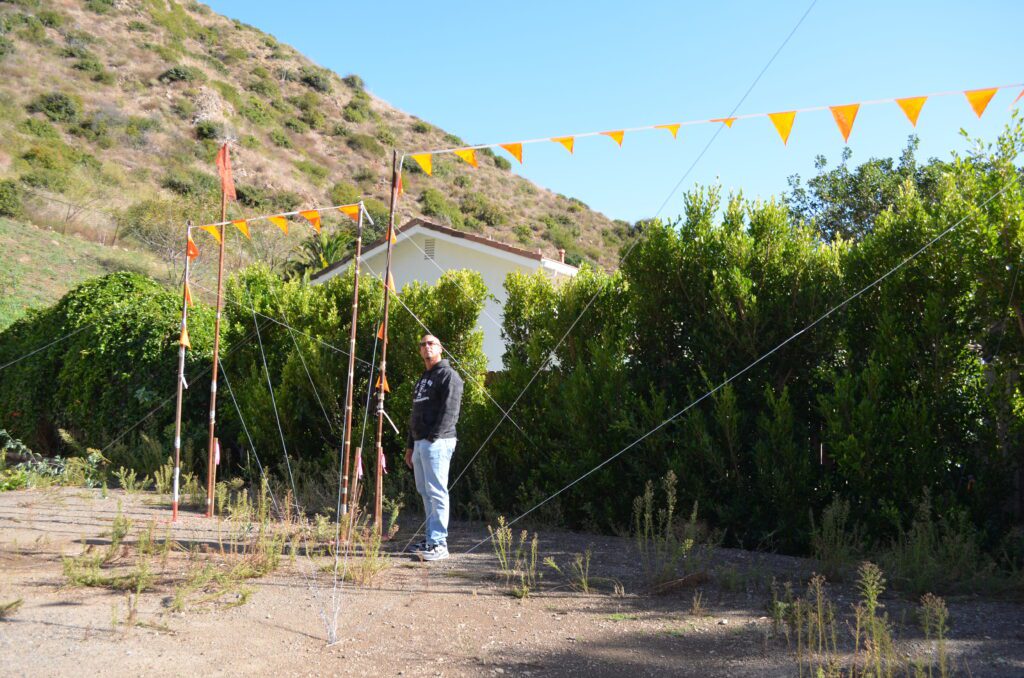
Royce Clayton in dispute with homeowners’ association over rebuild of house destroyed in Woolsey Fire
Royce Clayton’s dream home sat in a cul-de-sac in the Malibu West neighborhood.
The one-story house with a pool was a residence where Clayton, his wife Samantha, and their four children could rest their heads and enjoy the benefits of living in Malibu.
“My kids could be outside,” said Clayton, a 54-year-old Malibu resident for over two decades. It was such a neat place for kids to grow up. It was perfect—a dream home for raising kids.”
That dream was burnt down in November 2018 when the Woolsey Fire ripped through Malibu and destroyed 1,500 buildings, claimed three lives, and forced the evacuation of 260,000 people including the Claytons, who went to a friend’s home in Manhattan Beach.
Now, the Claytons, who rent a house in Westlake Village, are rebuilding their home of five years on Paseo Canyon Drive. However, according to a lawsuit, the Malibu West Swimming Club homeowners association and two of its board members — Tim Biglow and William David Little — are attempting to dash that renewed dream.
In the lawsuit, Royce and Samantha say the homeowners association’s board is selectively enforcing the homeowners association’s “Architectural Guidelines” and threatened legal action to prevent them from constructing a new home on their property. The Claytons claim the board’s position isn’t in line with other homes in Malibu West and is only being enforced against them. The board has demanded changes to the height of the home’s roof, the square footage of the residence, and the forward move of the house pad, the area on which the home will sit.

The lawsuit alleges that Biglow and Little, who are white, made racially charged comments against the Claytons, who are black, during the debate about how their residence should be constructed.
The Claytons claim they are targets of the discriminatory, harassing, and retaliatory housing practices and have suffered mental anguish and emotional distress. They are seeking compensatory and punitive damages. The lawsuit was originally filed in 2021 and featured a litany of activities, but a court date has yet to be set. According to Anahita Sedaghatfar, the Claytons’ lawyer, arguments on a demurrer filed by a homeowners association will be held in front of a judge in June.
Royce Clayton, the head baseball coach at Oaks Christian School in Westlake Village and a former Major League Baseball player, said the homeowners association is treating him differently than other members of the Malibu West.
“The only reason I’m left with is that I’m the only African American in this community,” he said.
Clayton said the board began stymieing his family’s proposed home design in 2020 after they received the proper permits from the city.
“The Claytons have been a moving target as to why their plans have not been approved,” Sedaghatfar noted.
Chief among the points of contention is how high can home’s roof can be, she said. The Claytons’ planned roof height of almost 12 feet is lower than their original home’s roof and is already within the association’s guidelines, which allow a residence’s roof to be up to 14 feet. The board is demanding the roof be lowered another two feet because they the say if the roof is higher it will block the view corridor of one of Clayton’s neighbors, Elizabeth Howland, has from her two-story home. Sedaghatfar said she and her clients have confirmed that to be untrue by measuring the desired height of the roof on the property.
“They want that two-feet reduction — that would render the Claytons’ roof height to be that of a garage,” she said. “You could stand there and touch it with your hand. We have proven in this case there is not a view obstruction. There is a house to the right of Royce’s that blocks the view anyway, so no matter what Royce did he couldn’t technically block anything.”
The Claytons began construction of their new home in March without the board’s approval. Sedaghatfar said the board threatened to file an injunction to stop the building. If the association issues an injunction, she said they will hold any board member who voted for it personally liable.
The board previously rejected the Claytons’ proposed size of the home of approximately 3,364 square feet — 164 square feet over association’s guideline limit of 3,200 square feet, according to the lawsuit. The family’s original home was around 3,102 square feet. The lawsuit notes that the home on the right side of the Claytons’ house, constructed within the last few years, was approved for up to 4,800 square feet and a two-story build but was built to be a single-story home of 4,011 square feet.
“The Association and Board claim the neighbors’ home approvals were agreed to only after the neighbors filed a lawsuit,” the lawsuit reads. “Nevertheless, the result is that a home of 4,011 sq. ft. is being built and the Board cannot, in good faith, reject the Claytons’ request for an additional comparatively negligible 164 sq. ft. over the Guideline limit. Moreover, the development has many other homes that exceed 3,2000 sq. ft.”
The board denied the Claytons’ request to move their home five feet forward to be in compliance with the city and Malibu Fire Department’s requirements. The Claytons state the house pad must move forward to render the pool compliant with city codes, and because the original home was 3 feet too close the neighboring property line, so the city said the home must move three feet farther away from the boundary.
Additionally, city ordinances require homes like the Claytons’ to be built a certain distance from unimproved hillsides. The board contends that moving the house will negatively impact the views of Little, who lives across the street from the Claytons, and Howland. The board’s description of the Claytons’ home as a “nuisance” because of the homeowners’ request to move the home forward “is a malicious, unreasonable and exaggerated statement, though it further evidences the bias and racial prejudice the Board has against the Claytons,” the lawsuit reads.
The lawsuit notes that several people told the Claytons their home design plans would be approved if they allowed businesses aligned with Biglow, who works in the construction industry, to be involved in the rebuild. When the Claytons mentioned Biglow’s conflict of interest his attitude toward the Claytons soured.
“Biglow stated ‘[y]ou people [a triggering phrase for African-Americans] need to follow the rules’ on several occasions,” the lawsuit states. Additionally, Biglow was once asked to leave the Claytons’ property after he made comments with racial undertones toward the Claytons in the presence of other board members.
Little is accused of going on their property without their permission and harassing workers, who were removing weeds and building debris, at least four times. According to the lawsuit, Little said he became a board member “to specifically prevent the Claytons from building their proposed home and prevent the pad of the home being approved for being moved forward.”
According to the lawsuit, during a site inspection of the Claytons’ property, Little yelled that he didn’t want the Claytons’ home moved forward because he didn’t want Royce Clayton, a father of two teenage daughters, looking at his teenage daughter sunbathing.
“Mr. Little thus blatantly accused Plaintiff Royce Clayton of being a pedophile and a sexual predator with knowledge of the falsity of said statement,” the document reads. “Indeed, the racist stereotype of African American men as sexual predators to be feared by Caucasians, harkens back hundreds of years.”
Sedaghatfar said it is shocking how boldly biased the actions against the Claytons have been.
“It is not even an attempt to do it in a way that would be covered,” she said. “It is a rare case where you have a situation where someone is blatantly making racist comments. We have explicit racial comments that were made and the HOA has done nothing to reprimand or say, ‘We don’t like those comments.’ How can the HOA argue that this is not discriminatory? How can you make that argument when at a minimum you have not denounced those comments of your members.”
Jennifer E. Newcomb, the attorney for Biglow, Little, and the board, wrote in an email “The Association denies all of the allegations. The Association has no further comment and will not be litigating this dispute through the media.”
Clayton, who grew up in Inglewood, said he has experienced racism throughout his life. He recalled a time in his youth when the n-word was written on the exterior of his home.
“We are not victims,” Clayton stated. “I refuse to be a victim of anything. I’m a person that preservers through anything that is ignorant.”
He is disappointed that his children, all teenagers, are going through this experience.
“They are never going to live in that house,” Clayton said. “That is the truth. Its persisted that long where they have taken away what I wanted for my children to be raised in this home. You aren’t God to make those decisions.”
The board, he said, is overextending their influence.
“Who does this to a family that has lost everything in a fire?” Clayton mused. “These are not my neighbors. Neighbors don’t treat you like that.”
Sedaghatfar said Jason Riddick, Malibu West board member, and his wife have taken legal action against the Malibu Planning Commission in court so they can build an accessory dwelling unit on their property. She said Riddick has stated that several people in Malibu West have ADUs on their property without city approval, but no one in the community has complained.
“So that’s okay?” Sedaghatfar asked. “The Claytons have city approved plans that are within in the guidelines, yet six years later their plans are not approved. This is discrimination.”
“These are fire victims, Sedaghatfar. “You have two people on the board who are admittedly trying to find every reason to not let them rebuild.”
